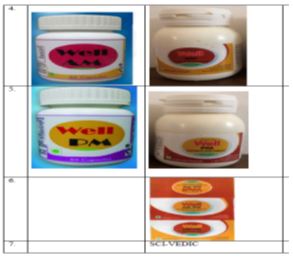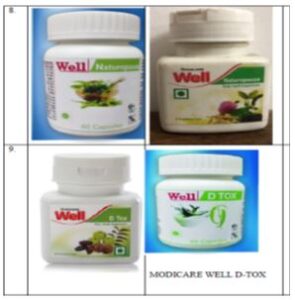Delhi High Court: In a case wherein, the plaintiff had filed an application seeking summary judgment under Order 13-A of the Civil Procedure Code, 1908 (‘CPC’), Prathiba M. Singh, J.*, opined that the present case was a fit case for the grant of summary judgment as per Order 13A of the CPC and permanently restrained the defendants from manufacturing, selling, offering for sale any cosmetics, wellness or nutraceuticals products under the formative ‘WELL’ marks. The Court further clarified that the present order did not recognize monopoly or exclusivity for the plaintiff’s ‘WELL’ marks and directed the online listings of the defendant’s product to be taken down from the defendants’ and any third-party websites. If the defendants did not take them down within two weeks, the plaintiff was free to write all online platforms to seek delisting of these infringing products.
Background
In the instant case, the plaintiff, Modicare Limited, manufactured, marketed and sold large number of fast-moving consumer goods products, which included food processing products, agriculture chemicals, personal care, nutraceuticals and health care products. The plaintiff was a part of one of India’s leading conglomerates and the plaintiff claimed to have more than 196 support centres, 865 Stock Keeping Units and 3,80,000 active Modicare consultants.
One of the plaintiff’s well-known marks ‘WELL’ was adopted by it in 2004 along with the mark ‘MODICARE’. Also, a series of ‘WELL’ marks was used by the plaintiff for its FMCG products.
The plaintiff’s word mark ‘WELL’, was filed for trade mark registration in 2002 but was objected and had not been registered till now. The plaintiff asserted that the plaintiff’s products with the WELL marks had certifications from prominent agencies and also, had licenses from Food Safety and Standards Authority of India (‘FSSAI’), Ministry of Health and Family Welfare, which mandated strict quality checks and ensured that the products were safe for public consumption and also, complied with the Food Safety and Standards Act, 2006.
The plaintiff asserted that it had crafted a unique trade dress with distinct elements for each of ‘WELL’ marks, which made the product easily recognizable with a strong recall value. The plaintiff had updated the trade dress for some products, however, the original cause of action remained same as the products with the old trade dress were still available in the market. Further it was also submitted that the characteristics of the labels adopted by the plaintiff for the products sold under ‘WELL’ marks constituted the artistic works under the Copyright Act, 1957.
The plaintiff was aggrieved by the defendant’s use of the marks namely, ‘WELL INTELLECTE’, ‘WELL KOREAN RED GINSENG’, ‘WELL D-TOX’, ‘WELL JOINT-EASE’, ‘WELL AM-PM’ and ‘WELL NATUROPAUSE’ and claimed that they had been identically copied by the defendants.
The plaintiff stated that in July, 2019, it discovered that the defendants products on various online portals and the defendants were jointly manufacturing, offering for sale of the plaintiff’s products on various online platforms. Further, investigation also revealed that the defendants were connected to each other and the said products originated from Defendant 1.
Thus, the present suit was filed and the Court vide order dated 24-09-2019 granted an ex parte ad-interim injunction for the marks, ‘WELL INTELLECTÉ’, ‘WELL RED GINSENG POWDER’, ‘WELL JOINT EASE’, ‘WELL AM-PM’ and word mark ‘SCI VEDIC’. However, the plaintiff did not press for an injunction on the labels, ‘WELL D TOX’ and ‘WELL NATUROPAUSE’ as their claims for these labels were based on passing off.
Subsequently, after the grant of interim injunction, the defendants were given repeated opportunities to file the written statements, however no written statement was filed and vide orders dated 08-04-2021 and 03-07-2022, the Joint Registrar closed the right of all the four defendants to file the written statements.
Thus, the plaintiff filed an application seeking summary judgment under Order 13A of the CPC.
Comparison of both the marks
Analysis, Law, and Decision
The Court opined that since in the present case, the defendants had not put up any defence and their right to file the written statement was also closed, therefore, as per Order 8 Rule of the CPC, this Court had the discretion to pronounce the judgment against the defendants or make such order in relation to suit as it considered appropriated.
The Court relied on Disney Enterprises Inc. v. Balraj Muttneja, 2014 SCC OnLine Del 781, S. Oliver Bernd Freier GMBH & CO. KG v. Jaikara Apparels, 2014 SCC OnLine Del 2686 and United Coffee House v. Raghav Kalra, 2013 SCC OnLine Del 2133 and opined that no evidence was required on the plaintiff’s behalf, especially since the plaint was already filed on the affidavit.
The Court observed that the product names had been identically copied by the defendants and the said products in the form of labels had also been registered by the plaintiff. Further the defendants were using the trade dress that was deceptively similar to the plaintiff’s products, which suggested an attempt to affiliate with or capitalize on the plaintiff’s goodwill. The Court opined that such activity would lead to confusion in the mind of the consumers as there was a possibility of the defendant’s products being passed off as the plaintiff’s.
The Court opined that the defendant’s products were likely to be confused with the plaintiff, as the brand names and product category both were identical and it also appeared that the defendants were using fictious FSSAI license as alleged by the plaintiff.
Thus, the Court relied on Cadila Health Care Ltd. v. Cadila Pharmaceuticals Ltd., (2001) 5 SCC 73 and Sun Pharma Laboratories Ltd. v. Ajanta Pharma Ltd, 2019 SCC OnLine Del 8443, and opined that in nutrition and wellness products, any chance of confusion ought to be avoided. The settled legal position is that in the case of pharmaceutical, cosmetics, health and related wellness products, a higher standard was required to be laid down, considering the damage that such products could cause to the consumers.
The Court relied on Mallcom (India) Limited v. Rakesh Kumar, 2019 SCC OnLine Del 6650 and opined that present case was a fit case for the grant of summary judgment as per Order 13A of the CPC and permanently restrained the defendants from manufacturing, selling, offering for sale any cosmetics, wellness or nutraceuticals products under the formative ‘WELL’ marks.
The Court restrained the defendants from using any other deceptively similar variants for the formative ‘WELL’ marks which constituted infringement. The Court further restrained the defendants from reproducing, printing or publishing any label or packaging which was a colourable imitation or substantial reproduction of the artistic features of the plaintiff’s ‘WELL’ marks and their depiction in artistic writing style, lay-out, get-up, colour scheme, etc., which infringed the plaintiff’s copyrighted labels.
The Court further clarified that the present order did not recognize monopoly or exclusivity for the plaintiff’s ‘WELL’ marks and directed that the online listings of the defendant’s product should be taken down from the defendants’ and any third-party websites. If the defendants did not take them down within two weeks, the plaintiff was free to write all online platforms to seek delisting of these infringing products.
The Court relied on Uflex Ltd. v. Government of Tamil Nadu, (2022) 1 SCC 165 and opined that since the present suit was the commercial suit, actual costs were liable to be granted in the plaintiff’s favour. Accordingly, the Court decreed the suit the cost statement for a sum of Rs. 11,63,650.
[Modicare Ltd. v. Maa Adishakti Multi Trade Enterprises, 2023 SCC OnLine Del 6514, decided on 13-10-2023]
*Judgement authored by- Justice Prathiba M. Singh
Advocates who appeared in this case :
For the Plaintiff: Akanksha Singh, Advocate;









